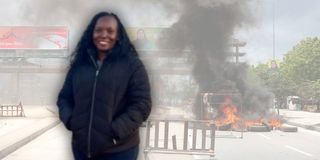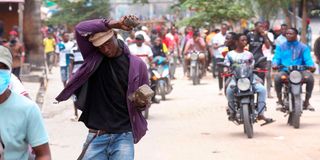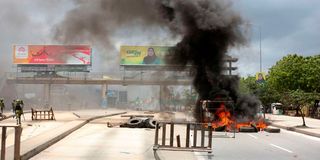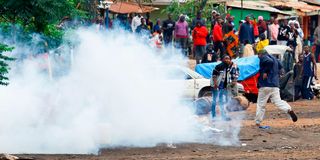
Lizzy Adundo Yogo during her assignment as an international election observer in Tanzania.
Lizzy Adundo Yogo was one of the international observers sent to Tanzania to monitor the elections. Then mayhem unfolded. She tells Tom Osanjo the nightmare she went through and how finally she got back home in Kenya.
It was not an ordinary Tuesday. The air was eerie and there was tension building up—you could almost touch it.
When I arrived in Dar es Salaam that morning, the natural thing to do was to get a briefing from the Independent National Electoral Commission (INEC) regarding the preparations for the electoral processes and procedures, as well as security.
When I got there, I was reliably informed that the East African delegation had left Tanzania for Nairobi.
As an election observer, one of the unspoken rules is always to stay together in a group, especially in a situation like Tanzania's.
There were intelligence reports that the opposition parties would stage protests on election day—these are not reports that we take lightly.
And so, going to the INEC offices and finding out that the people I was supposed to be with had left for Nairobi made me feel exposed. Anyway, I got my briefing and went to where I was staying to prepare for the next day, election day.

Lizzy Adundo Yogo during her assignment as an international election observer in Tanzania.
On Wednesday the 29th, I woke up nice and early to prepare for the long day ahead. My first polling station was Matsapa Primary School. I went in, and by 7am the ballots were officially opened, but there were no voters. I waited for one hour.
Between 7am and 8:15am, no one came to cast their ballots. I got impatient, and when I was just about to leave the station, I saw a truckload of army personnel. It's not ordinary to see so many army men, and so I panicked. I went back in to compose myself, and that is when I got an opportunity to ask one of them who was fighting in their country—because we know the work of the army.

Tanzanian voters queue to cast their votes at a polling station in Dar es Salaam on October 29, 2025.
He never answered me. I left for the second station, which was Ubungo Kisiwani Primary School. Here, I found the army fully in charge, and in the hour that I was there, I counted 15 women who had either just cast their ballots or were still in the queue.
Something was a bit unsettling about the presence of the army. I decided to look for a Kenyan friend who lives in Dar and stay with her for a day before I could travel back to Nairobi. Her house was not far from where I was.
Caught up in the chaos
When I got to her house, I received a message from my supervisor saying that I should leave Tanzania ASAP. Before I could process this and tell her what was going on, there was darkness—the power had gone out, and the next thing we heard were gunshots.
It was too late for me to leave now. I knew I had been caught up in the chaos, and I was right. The next few days were very tragic. With communication totally cut off, all we were listening to were the sounds of gunshots and tear gas canisters.

Tanzanian demonstrators participate in violent protests in Dar es Salaam following chaotic election on October 29, 2025.
As an asthmatic person, the asthma flared up. I had several attacks due to the tear gas that was being thrown into our compound until it became part of us. On Friday evening, I was in the bathroom having my evening shower when there was a loud thud in the house.
It felt like a spoon-like sound but heavier, falling down. My host came screaming to where I was, calling my name, and as I dashed out, she asked if I was hurt. I confirmed that nothing had happened to me. When I got back to the bathroom, that's when I noticed a bullet hole and a spent bullet right where I had been. That's when it dawned on me that I had escaped death by a whisker.
On Friday morning, I saw a strange number calling me. At this point in time, I knew I had to leave Tanzania, and guess who was calling—the Kenyan Ambassador to Tanzania, H.E. Isaac Njenga.
Ambassador Njenga had received an SOS phone call from my husband, and he said he had to get me out. On Saturday, it was practically impossible because there were still no flights or buses coming into or leaving Tanzania, and he could not come for me that day because where I was in Ubungo was the hotbed of violence.

Tyres burn along a deserted road in Dar es Salaam on October 29, 2025 during violent protests that marred Tanzania's general election.
He assured me that he would get me out as soon as he got a window to do so. He came in at the right time because at that moment, all I needed was an assurance that all would be well and I would get out unscathed. Somehow, too, in the same period, my daughter Hazel found a way of communicating with me, and all they did was assure me that I would be alright.
On Saturday, the ambassador called and told me that there was a possibility for a flight and that I should prepare to leave. I got ready by 7am, and shortly after, violence broke out again.
In my little corner, I asked God to make a way for me, quoting the parting sea story. I was now desperate to leave. At 3pm, I saw the ambassador calling, telling me that indeed Kenya Airways had three flights and that he was finding the best possible way to get me out, considering that they couldn't use a police escort given the circumstances and they could not pinpoint my exact location because of the internet disconnection.
So, by the traditional means of landmarks and asking locals, they risked it all and got to me. My journey back home was now possible. But not so fast—we had to go through roadblocks set up by both the army and the protesters.

Protesters at the Namanga One-Post Border crossing point between Kenya and Tanzania on October 30, 2025, a day after a general election marred by violent demonstrations.
The army warned me not to soil their country's good name when I eventually left, and the protesters told me to get to Kenya quickly and tell the world what was happening in their country.
Occasionally, we would pass dead bodies, and sometimes we would meet the protesters who had been arrested, kneeling by the roadside.
At exactly 1am Kenyan time, we landed at Jomo Kenyatta International Airport to the waiting arms of my husband. It felt so good to be back home, and it was such a proud moment having our national carrier, Kenya Airways, standing tall and getting most of the stranded tourists and observers out of Tanzania.






